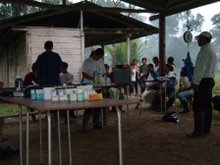

M.Lakshman, AP Photo / healthystartokawalton.org
Last week we discussed the role of ethics in emerging trends in global public health. Dr. Shahi asked an important question: Are we really confronting a new era in ethics, or are the challenges we face today the same as those faced by previous generations?
Like most of the class, I agree that the questions we must ask ourselves now, with regard to ethics, are more important than ever before. The impact of technology on our lives is immeasurable, and it's advancing and impacting society on a greater scale than we can quantify. In the face of persistent disparities (rich/poor, north/south, white/ethnic, urban/rural, male/female), there could be a scramble to end the shame that accompanies the fact that the two children pictured above exist in the same era, in the same global community.
To be fair, scientific and technological developments are not always a scramble, nor do they necessarily present ethical dilemmas. But products like ready-to-use therapeutic foods (RUTFs), labs-on-a-chip (LOCs), GM foods (such as Golden Rice), bioremediation techniques and many other recent and imminent advancements do pose ethical questions, particularly when thinking about long-term development. For instance, as my colleague Liyan Moghadam mentioned several weeks ago, one of the pitfalls of RUTFs is the fact that it is designed to nourish those in immediate danger of starving to death. What do we do after the peanut butter? Pat ourselves on the back??? And what about GM foods? Some independent studies have found links between GM potatoes cancer in lab rats. Do we really know what its impact will be on the beneficiaries/victims of (fortified) GM foods?
But we also have to ask ourselves: is this all rich man's talk? Even in our own community, there are populations that can't really afford to talk about ethics the way we do. Living a moral, honest, insulated life is much easier when all your primal needs are met (and then some). Does this mean we should consider different ethical standards for different populations? RUTF factories in Uganda bring jobs to people desperately in need of livelihoods. Inexpensive LOCs give the power of knowledge to people suffering from treatable illnesses they didn't even know existed (but will they get those inexpensive drugs that cure them? the food? the clean water?).
If you ask the people who would benefit, I don't think they would ever say no to a new technology that gives them more tools for life. But I think the developers of these exciting tools (who obviously have some knowledge of their importance to society) have a responsibility to think of not only the benefits but some of the challenges that their innovations present. They should work with organizations like the Institute for Global Ethics to ensure that those worldwide north/south, white/ethnic, urban/rural, educated/uneducated disparities we're seeing are not exacerbated--and are perhaps even diminished--by new technologies.
Because with regard to equality, our track record with science and tech so far raises some serious red flags (eg, read this poem on the global digital divide).





No comments:
Post a Comment